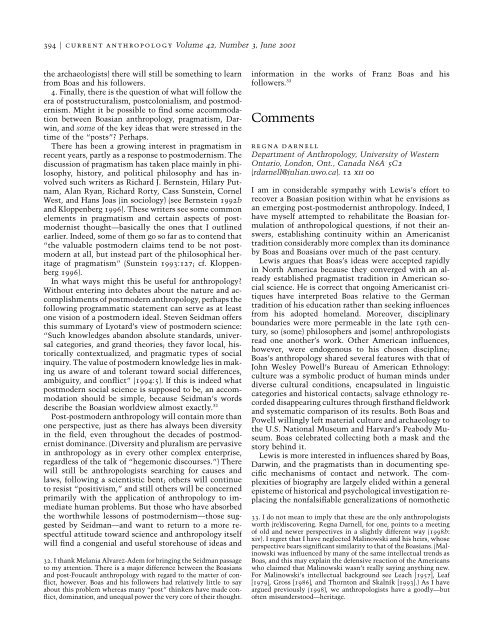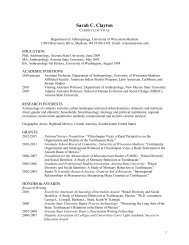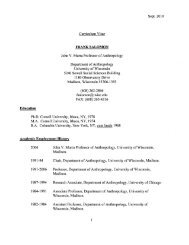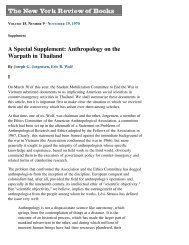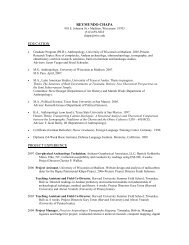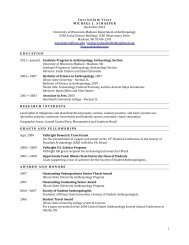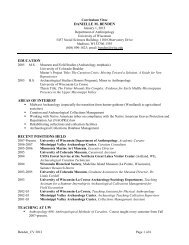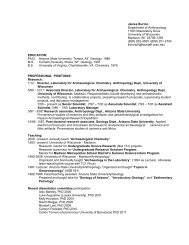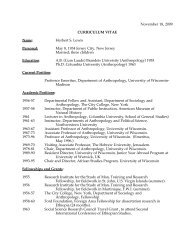Boas, Darwin, Science, and Anthropology1 - Department of ...
Boas, Darwin, Science, and Anthropology1 - Department of ...
Boas, Darwin, Science, and Anthropology1 - Department of ...
Create successful ePaper yourself
Turn your PDF publications into a flip-book with our unique Google optimized e-Paper software.
394 F current anthropology Volume 42, Number 3, June 2001<br />
the archaeologists) there will still be something to learn<br />
from <strong>Boas</strong> <strong>and</strong> his followers.<br />
4. Finally, there is the question <strong>of</strong> what will follow the<br />
era <strong>of</strong> poststructuralism, postcolonialism, <strong>and</strong> postmodernism.<br />
Might it be possible to find some accommodation<br />
between <strong>Boas</strong>ian anthropology, pragmatism, <strong>Darwin</strong>,<br />
<strong>and</strong> some <strong>of</strong> the key ideas that were stressed in the<br />
time <strong>of</strong> the “posts”? Perhaps.<br />
There has been a growing interest in pragmatism in<br />
recent years, partly as a response to postmodernism. The<br />
discussion <strong>of</strong> pragmatism has taken place mainly in philosophy,<br />
history, <strong>and</strong> political philosophy <strong>and</strong> has involved<br />
such writers as Richard J. Bernstein, Hilary Putnam,<br />
Alan Ryan, Richard Rorty, Cass Sunstein, Cornel<br />
West, <strong>and</strong> Hans Joas (in sociology) (see Bernstein 1992b<br />
<strong>and</strong> Kloppenberg 1996). These writers see some common<br />
elements in pragmatism <strong>and</strong> certain aspects <strong>of</strong> postmodernist<br />
thought—basically the ones that I outlined<br />
earlier. Indeed, some <strong>of</strong> them go so far as to contend that<br />
“the valuable postmodern claims tend to be not postmodern<br />
at all, but instead part <strong>of</strong> the philosophical heritage<br />
<strong>of</strong> pragmatism” (Sunstein 1993:127; cf. Kloppenberg<br />
1996).<br />
In what ways might this be useful for anthropology?<br />
Without entering into debates about the nature <strong>and</strong> accomplishments<br />
<strong>of</strong> postmodern anthropology, perhaps the<br />
following programmatic statement can serve as at least<br />
one vision <strong>of</strong> a postmodern ideal. Steven Seidman <strong>of</strong>fers<br />
this summary <strong>of</strong> Lyotard’s view <strong>of</strong> postmodern science:<br />
“Such knowledges ab<strong>and</strong>on absolute st<strong>and</strong>ards, universal<br />
categories, <strong>and</strong> gr<strong>and</strong> theories; they favor local, historically<br />
contextualized, <strong>and</strong> pragmatic types <strong>of</strong> social<br />
inquiry. The value <strong>of</strong> postmodern knowledge lies in making<br />
us aware <strong>of</strong> <strong>and</strong> tolerant toward social differences,<br />
ambiguity, <strong>and</strong> conflict” (1994:5). If this is indeed what<br />
postmodern social science is supposed to be, an accommodation<br />
should be simple, because Seidman’s words<br />
describe the <strong>Boas</strong>ian worldview almost exactly. 32<br />
Post-postmodern anthropology will contain more than<br />
one perspective, just as there has always been diversity<br />
in the field, even throughout the decades <strong>of</strong> postmodernist<br />
dominance. (Diversity <strong>and</strong> pluralism are pervasive<br />
in anthropology as in every other complex enterprise,<br />
regardless <strong>of</strong> the talk <strong>of</strong> “hegemonic discourses.”) There<br />
will still be anthropologists searching for causes <strong>and</strong><br />
laws, following a scientistic bent; others will continue<br />
to resist “positivism,” <strong>and</strong> still others will be concerned<br />
primarily with the application <strong>of</strong> anthropology to immediate<br />
human problems. But those who have absorbed<br />
the worthwhile lessons <strong>of</strong> postmodernism—those suggested<br />
by Seidman—<strong>and</strong> want to return to a more respectful<br />
attitude toward science <strong>and</strong> anthropology itself<br />
will find a congenial <strong>and</strong> useful storehouse <strong>of</strong> ideas <strong>and</strong><br />
32. I thank Melania Alvarez-Adem for bringing the Seidman passage<br />
to my attention. There is a major difference between the <strong>Boas</strong>ians<br />
<strong>and</strong> post-Foucault anthropology with regard to the matter <strong>of</strong> conflict,<br />
however. <strong>Boas</strong> <strong>and</strong> his followers had relatively little to say<br />
about this problem whereas many “post” thinkers have made conflict,<br />
domination, <strong>and</strong> unequal power the very core <strong>of</strong> their thought.<br />
information in the works <strong>of</strong> Franz <strong>Boas</strong> <strong>and</strong> his<br />
followers. 33<br />
Comments<br />
regna darnell<br />
<strong>Department</strong> <strong>of</strong> Anthropology, University <strong>of</strong> Western<br />
Ontario, London, Ont., Canada N6A 5C2<br />
(rdarnell@julian.uwo.ca). 12 xii 00<br />
I am in considerable sympathy with Lewis’s effort to<br />
recover a <strong>Boas</strong>ian position within what he envisions as<br />
an emerging post-postmodernist anthropology. Indeed, I<br />
have myself attempted to rehabilitate the <strong>Boas</strong>ian formulation<br />
<strong>of</strong> anthropological questions, if not their answers,<br />
establishing continuity within an Americanist<br />
tradition considerably more complex than its dominance<br />
by <strong>Boas</strong> <strong>and</strong> <strong>Boas</strong>ians over much <strong>of</strong> the past century.<br />
Lewis argues that <strong>Boas</strong>’s ideas were accepted rapidly<br />
in North America because they converged with an already<br />
established pragmatist tradition in American social<br />
science. He is correct that ongoing Americanist critiques<br />
have interpreted <strong>Boas</strong> relative to the German<br />
tradition <strong>of</strong> his education rather than seeking influences<br />
from his adopted homel<strong>and</strong>. Moreover, disciplinary<br />
boundaries were more permeable in the late 19th century,<br />
so (some) philosophers <strong>and</strong> (some) anthropologists<br />
read one another’s work. Other American influences,<br />
however, were endogenous to his chosen discipline;<br />
<strong>Boas</strong>’s anthropology shared several features with that <strong>of</strong><br />
John Wesley Powell’s Bureau <strong>of</strong> American Ethnology:<br />
culture was a symbolic product <strong>of</strong> human minds under<br />
diverse cultural conditions, encapsulated in linguistic<br />
categories <strong>and</strong> historical contacts; salvage ethnology recorded<br />
disappearing cultures through firsth<strong>and</strong> fieldwork<br />
<strong>and</strong> systematic comparison <strong>of</strong> its results. Both <strong>Boas</strong> <strong>and</strong><br />
Powell willingly left material culture <strong>and</strong> archaeology to<br />
the U.S. National Museum <strong>and</strong> Harvard’s Peabody Museum.<br />
<strong>Boas</strong> celebrated collecting both a mask <strong>and</strong> the<br />
story behind it.<br />
Lewis is more interested in influences shared by <strong>Boas</strong>,<br />
<strong>Darwin</strong>, <strong>and</strong> the pragmatists than in documenting specific<br />
mechanisms <strong>of</strong> contact <strong>and</strong> network. The complexities<br />
<strong>of</strong> biography are largely elided within a general<br />
episteme <strong>of</strong> historical <strong>and</strong> psychological investigation replacing<br />
the nonfalsifiable generalizations <strong>of</strong> nomothetic<br />
33. I do not mean to imply that these are the only anthropologists<br />
worth (re)discovering. Regna Darnell, for one, points to a meeting<br />
<strong>of</strong> old <strong>and</strong> newer perspectives in a slightly different way (1998b:<br />
xiv). I regret that I have neglected Malinowski <strong>and</strong> his heirs, whose<br />
perspective bears significant similarity to that <strong>of</strong> the <strong>Boas</strong>ians. (Malinowski<br />
was influenced by many <strong>of</strong> the same intellectual trends as<br />
<strong>Boas</strong>, <strong>and</strong> this may explain the defensive reaction <strong>of</strong> the Americans<br />
who claimed that Malinowski wasn’t really saying anything new.<br />
For Malinowski’s intellectual background see Leach [1957], Leaf<br />
[1979], Gross [1986], <strong>and</strong> Thornton <strong>and</strong> Skalník [1993].) As I have<br />
argued previously (1998), we anthropologists have a goodly—but<br />
<strong>of</strong>ten misunderstood—heritage.


